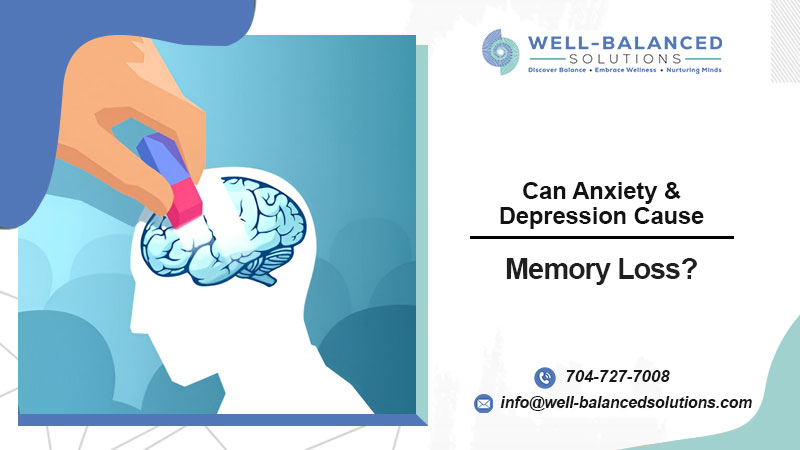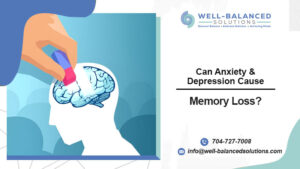Many human beings worry when they forget simple things, such as where they placed their keys and why they walked into a room. These moments, although common, can also be signs of deeper issues. Mental health plays a big role in how well our brain works. For example, depression may slow down brain activity, leading to short-term memory loss. This is not just about being forgetful.
It’s about how emotional stress can block focus, attention, and recall. Recent studies have shown a clear link between depression and memory loss, especially when it comes to storing and retrieving information. As a result, understanding this connection is medically important. It enables doctors to offer better care, and it reminds us to treat mental health with the same urgency as physical fitness.
The Role of Anxiety in Memory Problems
Anxiety works differently, but it also affects memory. It keeps the brain alert all the time, making it tired and prone to distraction. That’s why many people with anxiety say they can not focus and remember things well.
Moreover, Studies support that anxiety and depression cause memory loss together when both are present. In contrast to regular stress, continual anxiety pushes the brain into overdrive, mainly leading to fatigue and forgetfulness. This makes even small duties feel overwhelming.
Short-Term Memory Loss: What It Looks Like in Depression and Anxiety
Regularly, people with depression and anxiety are aware that they forget things more often. At the start, this short-term memory loss may seem small, like misplacing keys and forgetting easy words. However, over time, these signs can grow worse. Surprisingly, such symptoms can mimic dementia and even age-related memory decline. While dementia is more permanent, short-term memory impairment from mental health issues may improve with treatment.

This type of memory loss often accompanies low energy, brain fog, and difficulty focusing. Unlike age-related memory loss, these symptoms tend to fluctuate in severity, depending on stress and mood. Therefore, noticing patterns and triggers becomes essential. Thankfully, early help can make a big difference.
Depression and Memory Loss: Scientific Studies and Expert Insights
According to several clinical studies, depression and memory loss are deeply connected. For example, research from Harvard Medical School suggests that depression can reduce the brain’s ability to form new memories. A study published in the Journal of Psychiatry and Neuroscience explains how depression affects the hippocampus, a brain region crucial for memory.
These changes lead to a clear depression and loss of memory pattern. As the illness continues, memory struggles often increase. Additionally, depression causes memory loss by disrupting sleep and lowering attention. This makes it more difficult for the brain to store short-term memories. Luckily, therapy and medication can help improve both mood and memory over time.
When to Seek Professional Help
Sometimes memory problems can feel like simple forgetfulness. However, if you often forget names, lose focus, and struggle with daily tasks. It might be time to seek help. A sudden drop in memory, especially with anxiety and sadness, should never be ignored. Over time, these issues may get worse without support. That is why it is important to recognise the early signs.

If you often feel confused and cannot remember recent events, mental health support can help. Through professional evaluations, doctors can find the cause and guide you forward.
Treatment Options for Memory Loss from Anxiety and Depression
Happily, your memory loss linked to mental health is treatable. Therapists regularly use Cognitive Behavioural Therapy and Dialectical Behavioural Therapy to reduce stress and improve awareness.
However, Medications also help balance neurotransmitters and restore clarity. Additionally, small lifestyle changes, such as getting sufficient sleep, taking vitamins, and maintaining a routine, can help boost memory.
Why Choose WBS Mental Wellness for Mental Health Care?
WBS Mental Wellness is a trusted name when it comes to mental health and memory support. They focus on helping people feel better in mind and body. With an expert team, they offer support that feels personal, respectful, and safe. Their trained professionals listen with care and develop plans tailored to your unique needs.
Unlike others, WBS Mental Wellness offers online counselling, memory therapy, and mental health check-ups all under one roof. You can talk from home at your own pace with full privacy. Their goal is not just healing but clarity and peace. Book a consultation with WBS Mental Wellness to create your personalised stress-relief plan.
Conclusion
Depression and anxiety can affect how we think and remember. But with care, healing is possible. When the mind gets support, memory can slowly return. You are not alone; help is always available. Many people feel this way and do get better. Over time, your brain can feel clear again.
Always remember that depression causes memory loss, but it does not last forever. With the right help, things improve. Recovery takes time, but it is a real process. Do not lose hope, healing starts with one small step. Your memory and peace of mind can come back stronger than before.
FAQS
Q. Does depression cause short-term memory loss?
Yes, depression can cause short-term memory loss by affecting brain areas like the hippocampus. This may cause forgetfulness and confusion.
Q. Can anxiety and depression affect your ability to concentrate and remember things?
Yes, anxiety and depression both impair cognition and memory by overwhelming the brain with pressure. This causes difficulty remembering current tasks and thoughts.
Q. How does stress from depression lead to memory issues?
Chronic stress from depression raises cortisol levels, disrupting memory functions in the brain. This is especially evident in short-term memory and information retention.
Q. Is memory loss from depression and anxiety everlasting?
No memory loss connected to depression and anxiety is usually reversible with the right treatment. Therapy and lifestyle changes can help restore memory.
Q. What is the difference between regular forgetfulness and depression related memory loss?
Normal forgetfulness is occasional and harmless, while depression related memory loss is frequent and disruptive. It frequently affects recognition, thinking, and daily function.
Reference







